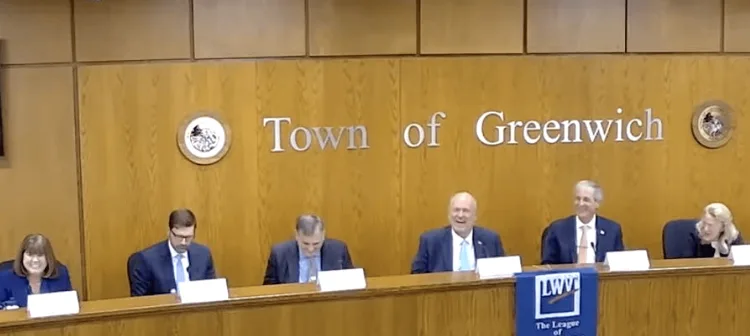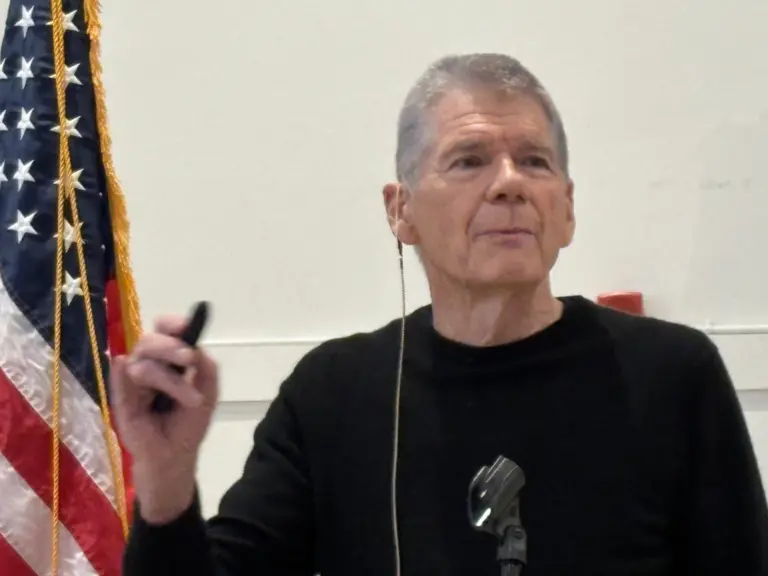
By Sentinel Staff
The League of Women Voters’ October 7 debate for the Greenwich Board of Estimate and Taxation (BET) offered residents more than a glimpse of 13 candidates competing for 12 seats — it revealed a town wrestling with how it governs itself.
The two-hour forum, held before a full audience and streamed live, highlighted two intersecting debates: one about tone and civility, and another about fiscal philosophy — whether Greenwich should remain cautious in spending or use longterm debt to meet growing infrastructure and education demands.
The BET, a 12-member body that sets the town’s annual budget and approves all major capital projects, is evenly divided between Republicans and Democrats. The party receiving the most votes in November will control the tie-breaking chairmanship, a small procedural power with enormous consequence.
That reminder framed the evening: behind every discussion of debt, capital projects, or collaboration was the unspoken question of leadership.
Setting the Tone: Restoring Civility
Democrat Stephen Selbst, running for his third term, opened by addressing the most persistent criticism of the current board — its division.
“There’s been too much dysfunction,” he said. “Years ago, members talked issues through before public meetings. Now, things just appear at the table for the first time.” His solution: return to pre-meeting dialogue and civility. “It’s not a hard thing to do,” he said. “We just have to be willing.”
Republican Joe Kelly, known for his humor and candor, said collaboration often begins over coffee — or a drink. “When I joined the Board of Education, it was called the most dysfunctional board in town,” he said with a grin. “So I took everyone out for a drink. We got to know each other. It worked.”
Republican Joe Pellegrino distilled his approach into four tenets: “Build personal relationships, actively listen, allow for differences, and build consensus. If we can do that, we’ll eliminate a lot of friction.”
Democrat David Weisbrod, a former J.P. Morgan vice chairman, agreed that civility is essential but said the problem runs deeper than decorum. “Today’s BET is broken,” he said. “It’s time for new leadership — one that’s disciplined, competent, and focused on keeping taxes low and predictable.”
Independent Karen Fassuliotis, currently serving on the board, said she’s running outside party lines precisely because she’s tired of the hostility. “Every year it’s gotten worse,” she said. “Both parties have been punching each other in the face. Community over politics — that’s my campaign, and that’s what this town needs.”
How Greenwich Governs Itself
The evening’s second question examined how the BET interacts with other governing bodies — the Board of Education, the Representative Town Meeting (RTM), and the Board of Selectmen.
Republican Leslie Tarkington, one of the BET’s most senior members, described the formal process set by the town charter: the First Selectman drafts a proposed budget, department heads contribute requests, and the BET reviews, adjusts, and recommends the final version for RTM approval. “Respect for that process is critical,” she said. “We need better communication with the Board of Education — there used to be regular meetings. That’s how good government functioned.”
Democrat Eliot Alchek disagreed that the system merely needs fine-tuning. “We have to do better — frankly, we can’t do much worse,” he said. “Last year, Democrats supported the First Selectman, the Board of Ed, and the RTM. Yet we saw chaos because of last-minute decisions. You can’t throw a $4 million cut on the table on decision day.”
Selbst reinforced that view, warning of “mission creep.” “The BET’s job is to find a way to finance the will of the community,” he said. “Instead, it’s been acting as a super-legislature — substituting its policy preferences for those of the elected bodies actually responsible for making those decisions.”
Republican Matt Deschamps pushed back, saying that process — not motive — was to blame. “Budget guidelines have been developed unilaterally,” he said. “They should be bipartisan, transparent, and approved publicly before departments start planning their budgets.”
That critique resonated with Republican Joshua Brown, a 32-year RTM veteran: “I’ve worked with a lot of BETs. The process has drifted. We can and must restore structure and civility.”
The $4 Million Question
No topic drew more passion — or clearer differences — than the $12 million requested increase to the Board of Education’s budget earlier this year. The BET approved an $8 million increase on top of the $2.5 million surplus the Board of Education carried over from last year’s unspent funds.
Brown began cautiously: “I wouldn’t have supported a $4 million reduction at the eleventh hour. We need early guidance and honest discussion.”
Fassuliotis explained that the decision was mischaracterized. “It wasn’t a cut,” she said. “It was a reduction of a proposed 5.1 percent increase to 3 percent. Schools ended with a $2.5 million surplus. Enrollment is down by more than 800 students, yet staffing hasn’t changed. That’s not sustainable.”
Democrat Doug Fenton called the reduction “a unilateral cut that ignored available data and real-world impacts.” He added, “They had months to revisit it — any one of the six Republican members could have reopened the budget. None did.”
Democrat Laura Erickson, a former Board of Education chair, fired back. “Let’s be clear — it was a cut,” she said. “It forced last-minute busing and staffing changes that disrupted families. Budget decisions shouldn’t blindside the community. Communication is key.”
Kelly agreed, recalling his own tenure as BOE chair. “When I was chair, we didn’t have drama,” he said. “We talked with the BET early and found common ground before it ever hit the press.”
Republican Pellegrino framed the issue as one of planning. “We should have budget guidelines by July,” he said. “Sit with the Board of Ed in August, go through the numbers, and align expectations early. If we do that, no one gets surprised.”
Democrat Weisbrod, summing up his party’s position, said, “These are not numbers — they’re programs, they’re children, they’re teachers. The community deserves a process that’s thoughtful and transparent, not abrupt and political.”
Debt, Duration, and the “Greenwich Premium”
From education to infrastructure, the conversation turned to long-term financing — specifically, whether Greenwich should issue longer-term bonds to pay for major projects.
Republican Pellegrino defended the town’s long-standing “modified pay-as-you-go” model, under which projects are financed with a mix of short-term notes and five-year bonds. “It’s served us well for decades,” he said. “We’ve stayed responsible not only to this generation but to the next.”
Erickson argued that delay is its own form of debt. “It took condemned buildings and raw sewage before we rebuilt Central and Old Greenwich Schools,” she said. “Delaying projects doesn’t save money — it doubles costs later.”
Democrat Alchek offered a broader perspective. “Our pay-as-you-go approach is unusual,” he said. “Virtually every AAA-rated town in America issues longterm debt for schools. We don’t. And that’s fine — but let’s be honest. It’s not about financial virtue. It’s about avoiding the project.”
Fassuliotis disagreed. “Not normal can be good,” she said. “Pay-as-you-go forces tough choices and keeps us from overcommitting. That’s been Greenwich’s secret sauce since 2007.”
Kelly, who spent 25 years in the bond business, brought a generational lens. “Debt is borrowing from our kids,” he said. “If we extend duration too far, we’re pushing the bill to them. Greenwich has always prided itself on paying its way.”
Democrat Bednar offered a nuanced take. “We have a AAA credit rating — higher than the U.S. government,” she said. “Our short-term borrowing saves interest costs, and we retain flexibility. Even our five-year bonds can be refinanced if needed.”
Weisbrod closed the topic by calling for balance: “Prudence doesn’t mean paralysis,” he said. “We need multi-year capital planning that matches timing and need. That’s how we invest wisely and keep taxes predictable.”
Leadership, Trust, and the Road Ahead
As the debate stretched past two hours, moderator Kaplan asked candidates to summarize their vision in one-minute closing statements. The responses — alternating between earnest appeals and quiet defiance — crystallized the philosophical divide that has defined this election.
Erickson began: “I hope those watching tonight see the difference between the two slates. Our Democratic team believes in competence, transparency, and planning ahead. That’s how we restore stability.”
Selbst followed, emphasizing experience. “We’ve demonstrated we have the ability and judgment to manage this town responsibly. The choice is clear — elect the six Democrats on Row A.”
Fisher, defending Republican stewardship, countered: “We have the lowest mill rate in the state — and also the highest quality of life. That’s not an accident. Taxpayer dollars are a scarce resource and must be treated as such.”
Tarkington reinforced that message: “Nearly half of our residents are either lower income or living on fixed incomes. Republicans are committed to keeping Greenwich affordable for everyone.”
Alchek, representing the Democratic slate’s reform message, declared: “We can do better — we must do better. The chaos of last-minute cuts and partisan shouting matches isn’t normal. Greenwich deserves better leadership.”
Deschamps emphasized stewardship: “Our duty begins with listening and ends with responsible management,” he said. “We can only serve taxpayers if we work together.”
Bednar, reflecting on her Wall Street experience, said, “Greenwich is in a win-win situation. The challenges we’re debating tonight are solvable. Let’s not screw it up.”
Brown focused on process and accountability. “We need to rebuild a real capital improvement plan,” he said. “This town runs best when it plans ahead.”
Fenton, who brings a data-analytic approach, added: “Decisions should be fact-based and outcome-driven. That’s how you deliver value for taxpayers.”
Independent Fassuliotis offered perhaps the most personal appeal: “The Greenwich I grew up in was a place where neighbors debated honestly, not as partisans. I’m running as an independent because I’m tired of the drama. You have a choice: double down on division, or choose community over politics.”
Weisbrod, representing the Democrats’ call for change, said, “For two years, the BET has been mired in gridlock. It’s time for a new direction and new leadership committed to fiscal discipline and respect.”
Kelly, ever the connector, invoked camaraderie. “We’re a team of Greenwich neighbors, old and new, and we’ll make decisions together — no tiebreakers needed,” he said.
Finally, Pellegrino ended the night with a tone of gratitude and reassurance. “When you vote, ask yourself who you trust,” he said. “Trust that we’ll listen, collaborate, and keep Greenwich strong.”
As voters weigh their choices, they are deciding not only who will manage Greenwich’s vast $600 million budget but who will set its tone for the next two years. The winner of the chairmanship — decided by the party receiving the most total votes — will hold the tie-breaking power that has defined many of the town’s most contentious moments.




